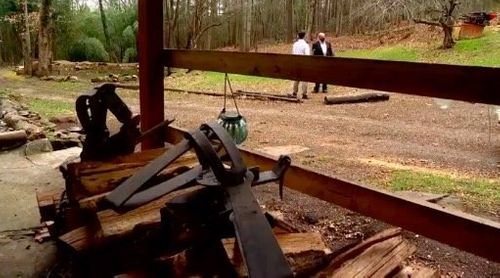Numerous black bears losing limbs; how groups are working to prevent illegal trappings

Click here for updates on this story
BUNCOMBE COUNTY, North Carolina (WLOS) — There is a growing concern in the mountains over the safety of bears as the number of reported 3-legged bears grows. Private groups are now forming to investigate bear poaching and illegal activity to harm bears.
“I enjoy watching them,” said Col. Scotty Morgan talking about bears roaming through his Buncombe County yard.
Morgan says the bears are just a part of living in the mountains. “The bears live a hard life. They’re mischievous, they are really a lot like people,” said Morgan.
When he speaks of a hard life, Colonel Morgan knows what he is talking about. He was a prisoner of war in North Vietnam and knows what it is like to be locked up in shackles.
Now he is concerned that traps are hurting the local bear population. “That’s a shame. They are illegal to use, but they sell them,” Col. Morgan said of the sales of bear traps.
“There’s poaching going on anywhere there is black bears,” said Alex Williams. Alex Williams is the Operational Director of Help Asheville Bears. The organization is working to raise awareness of bear poaching and put an end to it. “In just a little over a year and a half, we have come to a total of 24 bears with missing limbs in the Smoky and Appalachian Mountains,” said Williams.
Now, the group is offering rewards that lead to catching those who they believe are responsible for trapping. “To see this many three-legged bears, how many are not escaping?” retorted Jody Williams. Jody helps run the organization with his brother.
It all started when they noticed a bear they named ‘Peaches.’ The bear would frequent Jody’s home. Eventually, Peaches would return with cubs and a missing limb. This led them to believe this is happening because of people trapping bears for their parts.
“When you see a bear missing a limb, it’s not that someone has cut one limb off, they escaped a trap,” said Williams.
William Lance says it is something he is familiar with and even witnessed and subsequently reported to officials. He says a family who was neighbors with his mom were involved in a ring.
“This went on since 1998 and it just kept getting worse. They had an album there that showed the pictures where they shot bears with so many arrows,” recalled Lance.
Bear traps are legal to buy in North Carolina, but not legal to use for trapping wildlife.
“First of all, bear trapping is illegal,” explained Captain Andrew Helton with the North Carolina Wildlife Resource Commission.
Captain Helton says there is a hunting season for bears, but they still run across violations. He says the main issues they run into are bears being hunted out of season and baiting of bears with processed foods — something that is illegal in North Carolina.
“Generally, what we see, where people commit violations, is actually taking bears over bait or taking bears in closed season,” said Capt. Helton.
As for trapping, Captain Helton says the issue comes down to a lack of evidence. “We’ve had some reports in the past and in the last couple of years we’ve looked into those reports very thoroughly, and we’ve just not found any evidence,” said Capt. Helton.
“We’ve got upwards of a dozen or more cases in that area,” said Tony Wisniewski. Wisniewski is a part of a newly formed private group called Poacher Strike Force. It’s a North Carolina-based organization aimed at collecting evidence law enforcement needs to prosecute suspected poaching cases.
“We do a lot of interviews, local people in the area. We follow up on a lot of Facebook stuff. We take a lot of film. We’ve got cameras and then we present it to law-enforcement and then they can make a better case with the use of that,” said Wisniewski.
In addition to this, they also incorporate drones into their investigations.
Poacher Strike Force handles cases all around North America. They are made up of retired law enforcement, military, and outdoorsman. The scope of their work involves any animal or resource that is being illegally taken.
The group has already had successful cases in West Virginia and soon hopes to have similar results in Western North Carolina.
“We’re going to be in that area really hard over the next 30 to 45 days when the bears come out of hibernation because they are very vulnerable to food, they are hungry and it isn’t going to take a lot to draw them into a particular area,” said Wisniewski.
The minimum fine for someone caught trapping a bear is $2,000, which does not include court costs and replacement on each bear that is taken illegally which can run around an additional $2,200.
Please note: This content carries a strict local market embargo. If you share the same market as the contributor of this article, you may not use it on any platform.